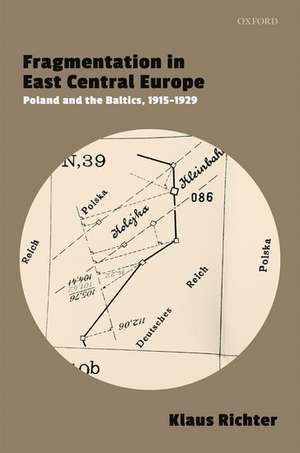Fragmentation in East Central Europe: Poland and the Baltics, 1915-1929
Autor Klaus Richteren Limba Engleză Hardback – 14 apr 2020
Preț: 674.42 lei
Preț vechi: 783.97 lei
-14% Nou
Puncte Express: 1012
Preț estimativ în valută:
129.06€ • 133.98$ • 107.62£
129.06€ • 133.98$ • 107.62£
Carte disponibilă
Livrare economică 21-27 februarie
Preluare comenzi: 021 569.72.76
Specificații
ISBN-13: 9780198843559
ISBN-10: 0198843550
Pagini: 368
Ilustrații: 16 black and white figures/maps
Dimensiuni: 166 x 245 x 27 mm
Greutate: 0.68 kg
Editura: OUP OXFORD
Colecția OUP Oxford
Locul publicării:Oxford, United Kingdom
ISBN-10: 0198843550
Pagini: 368
Ilustrații: 16 black and white figures/maps
Dimensiuni: 166 x 245 x 27 mm
Greutate: 0.68 kg
Editura: OUP OXFORD
Colecția OUP Oxford
Locul publicării:Oxford, United Kingdom
Recenzii
This book makes a great contribution to multiple fields: Baltic studies, modern European history, and political and international history.
The collapse of imperial rule following WW I transformed East Central Europe by sanctioning the emergence of new states. In this solidly documented scholarly analysis, Richter (Univ. of Birmingham, UK) seeks to revise some traditional understandings of how this happened and what the nature of this process was. He asserts that the region's fragmentation began during the war, initiated by Germany, and affected much that followed, including statist approaches that endured into the interwar period. ... There is a fine attention to detail in this volume, which assumes substantial background knowledge. Though closely argued, the book's conclusions bear significantly upon how one understands the post-Cold War order in this region.
In his superbly researched and persuasively argued Fragmentation in East-Central Europe: Poland and the Baltics, 1915-1929, Klaus Richter analyzes the phenomenon of the interaction between national sovereignty and fragmentation during the First World War and its aftermath....We hope there will be more to come of monographs like his.
...remarkable...
The collapse of imperial rule following WW I transformed East Central Europe by sanctioning the emergence of new states. In this solidly documented scholarly analysis, Richter (Univ. of Birmingham, UK) seeks to revise some traditional understandings of how this happened and what the nature of this process was. He asserts that the region's fragmentation began during the war, initiated by Germany, and affected much that followed, including statist approaches that endured into the interwar period. ... There is a fine attention to detail in this volume, which assumes substantial background knowledge. Though closely argued, the book's conclusions bear significantly upon how one understands the post-Cold War order in this region.
In his superbly researched and persuasively argued Fragmentation in East-Central Europe: Poland and the Baltics, 1915-1929, Klaus Richter analyzes the phenomenon of the interaction between national sovereignty and fragmentation during the First World War and its aftermath....We hope there will be more to come of monographs like his.
...remarkable...
Notă biografică
Klaus Richter is a historian of modern Central and Eastern Europe. He received his PhD in 2012 from the Technical University of Berlin, after which he held a research position at the German Historical Institute in Warsaw. He is currently working as Senior Lecturer and Birmingham Fellow at the University of Birmingham, and is director of the Birmingham Research Institute for History and Cultures (BRIHC). His previous book, Antisemitismus in Litauen. Christen, Juden und die 'Emanzipation' der Bauern, 1889-1914 (2013), was a study on Christian-Jewish relations in the Russian Empire's Lithuanian provinces. He is also the author of numerous articles and book chapters on the social history of East Central Europe as well as on the history of nationalism, ethnic conflict, and displacement.
